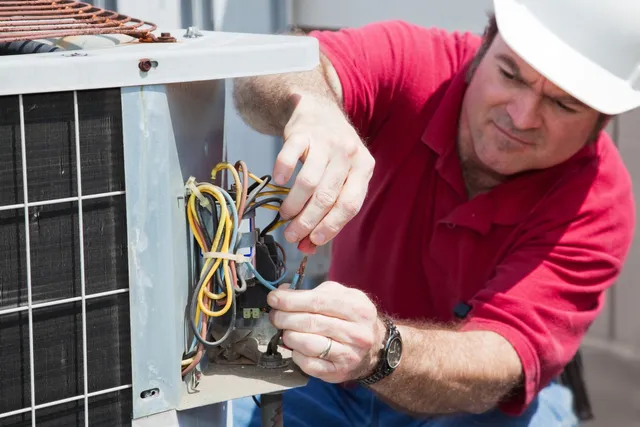Complexity of the AC System:
These days, air conditioning systems are complex systems of interconnected parts that are meant to function in conjunction. One of the most important parts of an air conditioning system is the compressor, which is in charge of pressurizing and recirculating the refrigerant so that heat may be exchanged. The high expense of replacing the compressor is greatly influenced by the complexity of the air conditioning system.
There is more to fixing a broken compressor than just replacing parts. To make sure that other critical components haven’t been damaged by the compressor failure, the complete system has to be checked out. Careful diagnosis, replacement of the defective compressor, and recharge of the system with refrigerant are all tasks that technicians must complete. The process is complex and requires specific knowledge and abilities, which increases the overall expense.
Specialized Equipment and Expertise:
The typical homeowner might not have easy access to the specialist tools and equipment needed to replace an air conditioner compressor. Among the many instruments used by experts in the field for replacement are manifold gauge sets, vacuum pumps, and equipment for recovering refrigerant. There is an additional charge for these tools, which raises the total cost of the service.
Also, knowing what you’re doing is really essential for a compressor replacement to go smoothly. The intricacies of heating, ventilation, and air conditioning (HVAC) systems are understood by specialists who undergo rigorous training. Their skill in securely handling refrigerants and their accuracy in diagnosing problems increase the value of their service but also drive up the cost of replacement.
Refrigerant Costs and Regulations:
Air conditioning systems cannot operate without refrigerants, which provide their own unique obstacles and expenses. The price of newer, more eco-friendly alternatives has risen due to the phase-out of older, less eco-friendly refrigerants, which has been triggered by environmental concerns.
Not only are refrigerants becoming more expensive, but there are also stringent rules about how to handle and dispose of them. In order to maintain environmental sustainability and safety, HVAC experts must follow these rules. Refrigerant recovery and recycling is an added expenditure to replacing AC compressors since it takes more time and resources.
Brand and Model Specifics:
The price of replacing your air conditioner’s compressor can vary greatly depending on its brand and model. Some companies make their own unique components, which can make them more expensive and more difficult to track down. Components that are specific to your system may be necessary to resolve compatibility difficulties.
In addition, the replacement costs of luxury products tend to be greater. Even while these companies are known for their exceptional performance and dependability, their distinct features can make replacement a bit more complicated. Some brands and models may be more costly than others due to factors such as the manufacturer’s quality of technical support and the availability of parts.
Labor Costs and Time Involved:
Changing an air conditioner compressor is a labor-intensive task, which drives up the price. HVAC specialists must dismantle the system in order to reach the compressor, remove it, and subsequently install a new one. If there are problems with the replacement or accessibility, this process can take longer than expected. A considerable amount of the total cost is attributed to labor, which includes the technician’s time and knowledge.
Additionally, it may be necessary to cleanse the system to remove pollutants or fix components damaged by the compressor failure in addition to replacing the compressor. The total cost of the service is affected by the technician’s time and effort engaged in each of these tasks.
Age and Condition of the System:
The cost to replace the compressor in your air conditioning system is heavily influenced by its age and general condition. You can have a harder time (and spend more money) locating compatible replacement parts for an older machine. Furthermore, systems that are older may have experienced wear and tear over time, necessitating more substantial repairs or even replacements.
To a certain degree, these problems can be addressed through routine maintenance, which increases the system’s lifespan and decreases the probability of unexpected compressor breakdowns. On the other hand, more issues may arise from skipping routine maintenance, which can lead to greater replacement expenses.
Warranty Coverage:
How much of a financial hit replacing your compressor will be depends on your air conditioner’s warranty. Specific parts of some systems are covered by manufacturer warranties for a set amount of time. You might not have to worry about paying for the compressor at all if your system is still covered by the warranty.
The coverage could be nullified due to specific conditions or improper maintenance, so it’s important to read and comprehend the warranty terms. Make sure you ask the manufacturer about the specifics of your warranty coverage; even if the compressor is covered, it might not cover labor costs or anything else related.
Market Forces and Demand:
The total cost of replacing an air conditioner compressor can be affected by external factors including market forces and the demand for HVAC services. As a result of the increased demand for AC services during peak seasons, prices could go up for both repairs and replacements. There may be more demand for HVAC services, which might make specialists busier and drive up labor prices.
The total cost of replacing an AC compressor can be affected by variations in the market price of materials and components, which can be caused by things like disruptions in the supply chain or changes in production costs. If homeowners are aware of these market trends, they may make more educated selections and maybe even schedule replacements outside of busy seasons.

